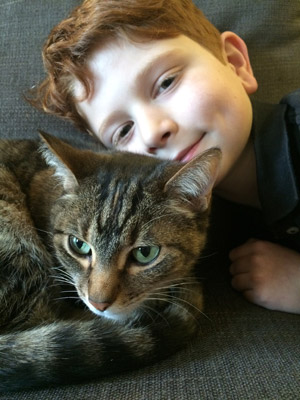
Nikki Schneck, a veterinary technician near Pottsville, PA, contributed to this article.
Fiona, a beautiful and super sweet one-year-old cat, had been vomiting 3 to 4 times per day for 3 days in a row. On the 3rd day, she was not doing well, had no appetite, felt lethargic and was crying out in pain. Fiona went to her family vet where X-ray results caused suspicion of a foreign body, i.e. an object that she could have swallowed.
Fiona was referred to the local emergency clinic. The emergency vet noted a painful belly during her exam. She repeated X-rays, and also suspected a foreign body. That’s when the emergency veterinarian asked me to perform belly surgery on Fiona.
Fiona’s belly surgery
During the exploratory surgery, I looked thoroughly at every organ in the belly, and felt the stomach and entire intestine multiple times. I found no sign of a foreign body! We were facing what we call a “negative exploratory surgery.” Rather than closing Fiona’s belly, I did something extremely important. I took biopsies of multiple organs:
- Liver
- Lymph node
- Stomach
- Several levels of the small intestine
Fiona recovered smoothly after anesthesia and surgery. She went home the next day. She needed pain medications and antibiotics, as well as strict rest and a plastic cone around her head to prevent licking at the incision.
Fiona’s biopsy result
One week later, biopsies revealed not one, but two conditions! First, Fiona had Helicobacter in her stomach. This is a normal bacteria in a cat’s stomach, but it is a bit controversial. We’re not sure how significant it is in pets. This is very different from humans, where Helicobacter can cause serious irritation and even stomach cancer.
IBD in Fiona
In addition, Fiona had Inflammatory Bowel Disease (IBD) in her small intestine. IBD is a very common condition in both cats and dogs, and it needs to be treated. It is usually found in middle-aged pets, so it was unusual (but not unheard of) to diagnose it in a one-year-old kitty.
Three weeks after surgery, Fiona came back for her progress exam and suture removal. She was eating, drinking, happy and purring. Everything was back to normal. Her family vet had started her on a special diet for IBD, which she should be fed exclusively for life. The idea is to prevent exposure to other types of food that might cause a flare up of the IBD.
IBD treatment
Additional treatments for IBD may include vitamins, fish oil and medications depending on the patient’s response to the diet change. IBD is a life-long condition that cannot be cured, but that can be controlled with the proper treatment. Sometimes, your family veterinarian or a board-certified veterinary internist may need to find the ideal treatment for your particular cat via trial and error.
What can we learn from Fiona?
Fiona’s guardian did the right thing. When cats vomit several times, they should be taken to their family vet or the emergency clinic.
There is no such thing as a “negative exploratory.” If a foreign body is not found, biopsies should always be taken to hopefully determine the cause of the problem.
Vomiting in cats more often than twice a month is NOT normal. You can read more about some very recent findings here.
Question to ask your veterinarian
- Why is my cat vomiting?
- What tests can you perform to find the reason?
- What treatment options do we have?
If you have any questions or concerns, you should always visit or call your veterinarian – they are your best resource to ensure the health and well-being of your pets.
